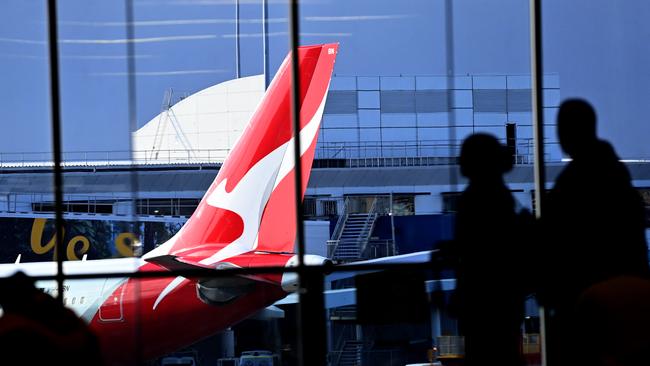Qantas execs, management, line up for three months of airport work
The airline has asked managers to put their hands up to work for up to five days a week handling baggage as pandemic issues, staff shortages bite.

Business
Don't miss out on the headlines from Business. Followed categories will be added to My News.
Qantas has asked its senior executives and managers to join a new contingency program that would see them leave their jobs and work as ground handlers up to five days per week for three months.
In a note to staff, the airline’s chief operating officer Colin Hughes said Qantas would recruit at least 100 managers, adding there was “no expectation that you will opt into this role on top of your full-time position”.
While Qantas executives and managers have previously worked at airports during peak periods, the extensive new program demonstrates the breadth of the worker shortage issues confronting the airline over the longer term.
“During your time in the contingency program, you’ll be an embedded resource within the ground handling partners,” Mr Hughes wrote. “This means you’ll receive a roster, be scheduled to operate and be supervised and managed in the live operations by our grand handling partners.”
As part of the program, staff will sort and scan bags and drive tugs – the vehicles used on the airport tarmac – moving luggage onto aircraft and between terminals.
Qantas axed some 1700 ground-handling jobs in the depths of the Covid-19 pandemic, a decision the Federal Court found was in breach of the Fair Work Act. The airline is appealing the matter in the High Court. But ongoing Covid-19 infections and a tight labour market have prevented the airline from fully staffing operations since the resumption of domestic and international travel.
Qantas’s reputation as a favoured brand and Australia’s most reliable airline has been brutalised in recent months, with customer service wait times spiralled, planes flying without bags, record low on-time departures and soaring flight cancellations. Issues such as phone wait times have now been fixed as the airline has frantically rehired – close to 2000 staff at last count – but the airline is still struggling with baggage as well as flight delays and cancellations.
In a note last week, analysts at Citi said it appeared staffing levels had risen 3 per cent, although capacity was down 10 per cent.
“It’s our singular company focus to support our teams to get our operation back to where it should be and provide our passengers the experience they expect from the airline,” wrote Mr Hughes in his note to staff last week.
A Qantas spokesman told The Australian: “We’ve been clear that our operational performance has not been meeting our customers’ expectations or the standards that we expect of ourselves.”
“While we manage the impacts of a record flu season and ongoing Covid cases coupled with the tightest labour market in decades, we’re continuing that contingency planning across our airport operations for the next three months,” the spokesman added.
Qantas mishandled luggage rate, according to those with knowledge of the figures but not authorised to speak publicly was around seven in 1000 over the June/July school holiday period, although for domestic travel – excluding Jetstar – the rate was some nine in 1000. That compares to Virgin Australia, which mishandled three out of every 1000 bags. The figure for Qantas rose to 20 in 1000 over Easter.
Airlines around the world have struggled to cope with the move from almost a total shut down during the height of the pandemic to record demand for travel. Most, including Qantas and Virgin – which collapsed into administration at the start of the pandemic, cut staff to reduce costs.
Qantas chief executive Alan Joyce used this time to introduce a cost-cutting program, targeting $1bn to 2023, much of which came in the form of job losses.
Now, Qantas and rival airlines are finding it difficult to rehire amid low unemployment, increased uncertainty about the aviation sector, and the lower than usual chances of staff travel perks due to high loads on aircraft.
Staff shortages coupled with sickness among employees has prompted both Qantas and Virgin to reduce the number of scheduled flights in an effort to ease pressure.
The problem of sickness among airline and airport workforces is not confined to Australia, with Europe’s civil aviation regulator EASA warning the issue could become a safety risk.
An EASA safety information bulletin shared by the Civil Aviation Safety Authority said understaffing at airports causing prolonged flight delays and cancellations could in turn lead to “increased levels of crew fatigue”.
Adding to the complications of starting airlines back up from scratch is a severe lack of spare parts for aircraft and ramp facilities. Just this week airBaltic grounded six of its fleet due to a lack of spare parts, while Qantas is using two of its Airbus A380 aircraft just for parts.
Originally published as Qantas execs, management, line up for three months of airport work





